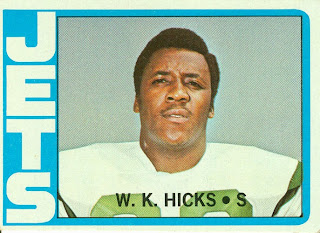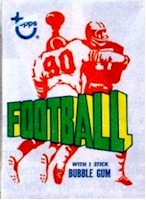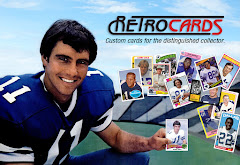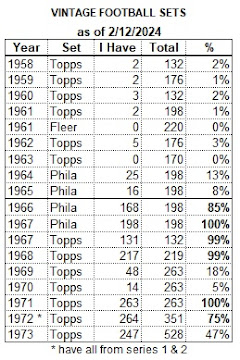Here are the 1972 Jets, four years removed from their guaranteed victory in Super Bowl III.
A lot had changed since then: The Jets returned to the playoffs in 1969, but lost in the first round to the Chiefs. That was followed by a 4-10 record in 1970 and 6-8 in 1971.
Only 6 of these players (Joe Namath, Emerson Boozer, Winston Hill, Dave Herman, Gerry Philbin, and Al Atkinson) remained from the Super Bowl team.
After leading the Jets to victory in Super Bowl III and returning to the playoffs in 1969, Joe Namath missed 9 games in 1970 and 11 games in 1971. He bounced back in 1972, starting 13 of the 14 games, and led the NFL in passing yardage (2816) and TDs (19), but the Jets finished at 7-7.
Namath was the Jets' #1 QB from 1965 to 1976 (except for missed time in '70, '71, and '73), and finished his career with the Rams in 1977. He was inducted into the Hall of Fame in 1985.
Emerson Boozer was drafted by the Jets in 1966, and had a 10-year career (1966-75) all with the Jets. He was a starting back in all but his final season. Normally the halfback, he played fullback in 1970, between the Matt Snell and John Riggins eras. Boozer led the AFL with 10 rushing TDs in 1967.
John Riggins was the Jets' 1st-round pick (#6 overall) in 1971. He was their starting fullback for his 5 seasons in New York, and rushed for over 1000 yards (and made his only Pro Bowl) in 1975, his final season with the Jets. He was also the Redskins' fullback for 8 seasons from 1976 to 1985.
John missed the 1977 season with a knee injury, and sat out the 1980 season over a contract dispute. Riggins was named the MVP of Super Bowl XVII, and also played in the Supe the next year. He was the 2nd player (after Jim Brown) to rush for 100 career touchdowns. He was inducted into the Hall of Fame in 1992.
George Nock was a 16th-round pick for the Jets in 1969. After rarely playing that season, Nock was the starting halfback in 1970, replacing Matt Shell in the lineup (with Emerson Boozer moving to fullback). In 1971 the Jets drafted John Riggins, so Nock found a spot on the bench, playing sparingly behind Riggins and Boozer. The back of this card says George joined the Redskins on 6-18-72. It was his final season.
Richard Caster was drafted by the Jets in 1970, and was a starting receiver from 1970 to 1977, including playing tight end from 1972-76. He later played for the Oilers (1978-80), Saints (1981), and Redskins (1981-82).
Winston Hill was drafted by the Colts in 1963, but began his career with the Jets that same year. He was a starting offensive tackle for the Jets for 13 seasons (1963-75), 8 seasons on the left side before moving over to the right side. Hill made the Pro Bowl 8 times during that 13-year span. After riding the Jets' bench in 1976, he finished his career with the Rams in 1977.
Dave Herman joined the Jets in 1964, and was their starting right guard every season from 1965 to 1973, leading the protection for Namath. Dave made the Pro Bowl in '68 and '69.
Gerry Philbin was drafted by the Jets in 1964, and was their starting left defensive end every season from 1965 to 1972, making the Pro Bowl in 1968 and 1969. He finished his career with the Eagles in 1973.
Al Atkinson was drafted by the Buffalo Bills in 1965, but played for the Jets that season. He was the Jets' starting middle linebacker every season from 1966 to 1972, and also played parts of '73 and '74 with the Jets before retiring.
W.K. Hicks was a starting cornerback and safety for the Houston Oilers from 1964 to 1969. He was the Jets' starting free safety for 2 seasons (1970-71), then a backup in his final season of 1972.
Chris Farasopoulos was the Jets' 3rd-round pick in 1971, and returned kicks and punts as a rookie. He replaced Hicks as the starting free safety in 1972 (and '73), and continued to return punts and kicks. He played his final season (1974) with the Saints.
Also check out the 1968 Jets.
.
Monday, August 11, 2014
Sunday, April 6, 2014
San Francisco 49ers
Well, I've put it off as long as I can (posting teams with horizontal cards). I never liked the horizontal format in the 1972 set. Maybe it was because the colors on the Cardinals' and Jets' cards are so bland. In any case it was poor planning by me, because now I have almost nothing BUT horizontal cards left to post (49ers, Rams, Bears, Lions, Cardinals, Jets, Colts, and Bills).
Here are the 1972 San Francisco 49ers. The 49ers had a good run from 1970-72 at the end of QB John Brodie's career, winning the NFC West for those 3 seasons. They just couldn't get past the Cowboys each time. After 1972, the team faded, until finally making the playoffs (and winning the Super Bowl) in 1981.
John Brodie was the Niners' #1 pick (3rd overall) in the 1957 draft. He played 17 seasons (1957-73) in the NFL, all with San Francisco. John shared the starting job with Y. A. Tittle from 1958-60, then was the starter every year from 1961-73 (except for missing some time in 1963 and 1972).
He made the Pro Bowl in 1965 and 1970, and led the NFL in passing yardage in '65, '68, and '70, and in TDs in '65 and '70. He retired after the 1973 season as the 3rd greatest career passer. Brodie was also on the professional golf tour from 1981 to 1998.
Like John Brodie, Steve Spurrier was the 49ers' #1 pick (3rd overall). This time in 1967 - 10 years after Brodie's selection. Spurrier won the Heisman Trophy in 1966, and was the team's punter for his first 4 seasons, as well as the backup QB.
He filled in for Brodie in 1972, but after Brodie's retirement, the team went with rookie QB Tom Owen in 1974. Spurrier shared the starting job with Norm Snead in 1975, then finished his career in 1976 with the expansion Tampa Bay Buccaneers. Since his retirement as a player, Steve has been a college coach, as well as brief coaching stints in the USFL and NFL.
Vic Washington was drafted by the Niners in 1970, and was a starting running back and kick returner for them from 1971-73. He played the 1974 season with the Oilers, then ended his career as a kick returner with the Bills in '75 and '76.
The 49ers drafted Ken Willard #1 (2nd overall) in the 1965 draft, and he was their starting fullback for 9 seasons (1965-73), making the Pro Bowl 4 times. Ken finished his career as a backup for the Cardinals in 1974.
Doug Cunningham was drafted by the 49ers in 1967. He played 7 seasons for them (1967-73), mostly as a kick returner, although he was also the starting halfback in 1969 and 1970. He spent his final season (1974) with the Redskins.
The more accomplished of the two 1970s' wide receivers named Gene Washington, this one was drafted #1 by the 49ers in 1969. He was a starting wide receiver for his 1st nine seasons, making the Pro Bowl in each of his first 4 seasons, and leading the NFL in reception yards (1100) in 1970. He missed the 1978 season, then started for the Lions in 1979.
Another first-round pick for the Niners in 1969 was Ted Kwalick. Ted played 6 seasons with the 49ers, and was their starting tight end for 3 seasons (1971-73), making the Pro Bowl in all 3 seasons. He also played for the Raiders from 1975-77.
Forrest Blue was the team's #1 pick in 1968, and played 7 seasons with the 49ers. He was the starting center in all but his rookie season, and was considered one of the best centers of his era. He made the Pro Bowl in his last 4 seasons in San Francisco, then was the Colts' backup center from 1975-78.
Bruce Gossett kicked for the Rams (1964-69) and 49ers (1970-74). He led the NFL in field goal percentage in 1964 and 1973.
Drafted in the 3rd round in 1967, Frank Nunley played his entire career (1967-76) with the 49ers. He was their starting middle linebacker from 1969-72, and 1974-76).
Dave Wilcox was drafted in the 3rd round in 1964, and was the 49ers' starting left linebacker for his entire 11-year career (1964-74). He was a 7-time Pro Bowler, and was inducted into the Hall of Fame in 2000.
Jimmy Johnson played his entire 16-year career (1961-76) with the 49ers. A 1st-round pick in 1961, he played two seasons as a backup and one as the free safety, then was the team's starting left cornerback for his final 13 seasons. He was a 5-time Pro Bowler and was inducted into the Hall of Fame in 1994.
Also check out the 1967 and 1971 49ers.
Here are the 1972 San Francisco 49ers. The 49ers had a good run from 1970-72 at the end of QB John Brodie's career, winning the NFC West for those 3 seasons. They just couldn't get past the Cowboys each time. After 1972, the team faded, until finally making the playoffs (and winning the Super Bowl) in 1981.
John Brodie was the Niners' #1 pick (3rd overall) in the 1957 draft. He played 17 seasons (1957-73) in the NFL, all with San Francisco. John shared the starting job with Y. A. Tittle from 1958-60, then was the starter every year from 1961-73 (except for missing some time in 1963 and 1972).
He made the Pro Bowl in 1965 and 1970, and led the NFL in passing yardage in '65, '68, and '70, and in TDs in '65 and '70. He retired after the 1973 season as the 3rd greatest career passer. Brodie was also on the professional golf tour from 1981 to 1998.
Like John Brodie, Steve Spurrier was the 49ers' #1 pick (3rd overall). This time in 1967 - 10 years after Brodie's selection. Spurrier won the Heisman Trophy in 1966, and was the team's punter for his first 4 seasons, as well as the backup QB.
He filled in for Brodie in 1972, but after Brodie's retirement, the team went with rookie QB Tom Owen in 1974. Spurrier shared the starting job with Norm Snead in 1975, then finished his career in 1976 with the expansion Tampa Bay Buccaneers. Since his retirement as a player, Steve has been a college coach, as well as brief coaching stints in the USFL and NFL.
Vic Washington was drafted by the Niners in 1970, and was a starting running back and kick returner for them from 1971-73. He played the 1974 season with the Oilers, then ended his career as a kick returner with the Bills in '75 and '76.
The 49ers drafted Ken Willard #1 (2nd overall) in the 1965 draft, and he was their starting fullback for 9 seasons (1965-73), making the Pro Bowl 4 times. Ken finished his career as a backup for the Cardinals in 1974.
Doug Cunningham was drafted by the 49ers in 1967. He played 7 seasons for them (1967-73), mostly as a kick returner, although he was also the starting halfback in 1969 and 1970. He spent his final season (1974) with the Redskins.
The more accomplished of the two 1970s' wide receivers named Gene Washington, this one was drafted #1 by the 49ers in 1969. He was a starting wide receiver for his 1st nine seasons, making the Pro Bowl in each of his first 4 seasons, and leading the NFL in reception yards (1100) in 1970. He missed the 1978 season, then started for the Lions in 1979.
Another first-round pick for the Niners in 1969 was Ted Kwalick. Ted played 6 seasons with the 49ers, and was their starting tight end for 3 seasons (1971-73), making the Pro Bowl in all 3 seasons. He also played for the Raiders from 1975-77.
Forrest Blue was the team's #1 pick in 1968, and played 7 seasons with the 49ers. He was the starting center in all but his rookie season, and was considered one of the best centers of his era. He made the Pro Bowl in his last 4 seasons in San Francisco, then was the Colts' backup center from 1975-78.
Bruce Gossett kicked for the Rams (1964-69) and 49ers (1970-74). He led the NFL in field goal percentage in 1964 and 1973.
Drafted in the 3rd round in 1967, Frank Nunley played his entire career (1967-76) with the 49ers. He was their starting middle linebacker from 1969-72, and 1974-76).
Dave Wilcox was drafted in the 3rd round in 1964, and was the 49ers' starting left linebacker for his entire 11-year career (1964-74). He was a 7-time Pro Bowler, and was inducted into the Hall of Fame in 2000.
Jimmy Johnson played his entire 16-year career (1961-76) with the 49ers. A 1st-round pick in 1961, he played two seasons as a backup and one as the free safety, then was the team's starting left cornerback for his final 13 seasons. He was a 5-time Pro Bowler and was inducted into the Hall of Fame in 1994.
Also check out the 1967 and 1971 49ers.
Subscribe to:
Posts (Atom)















.JPG)











.jpg)





















